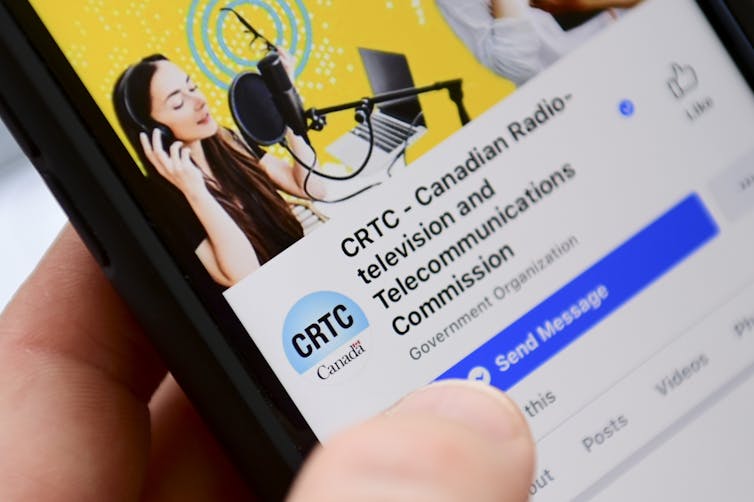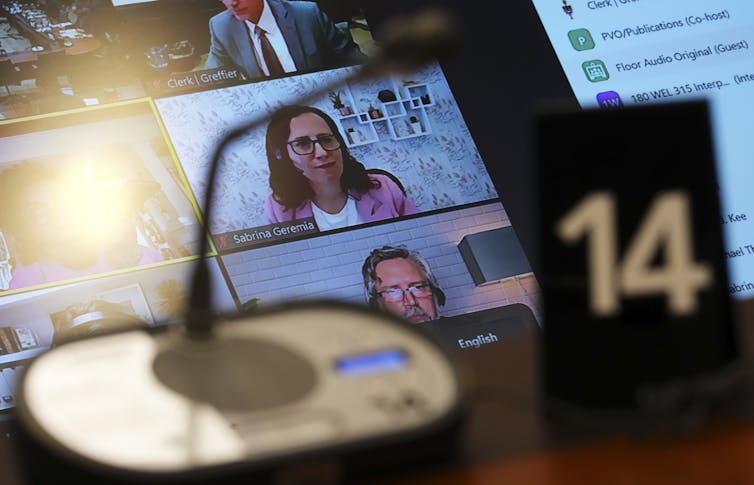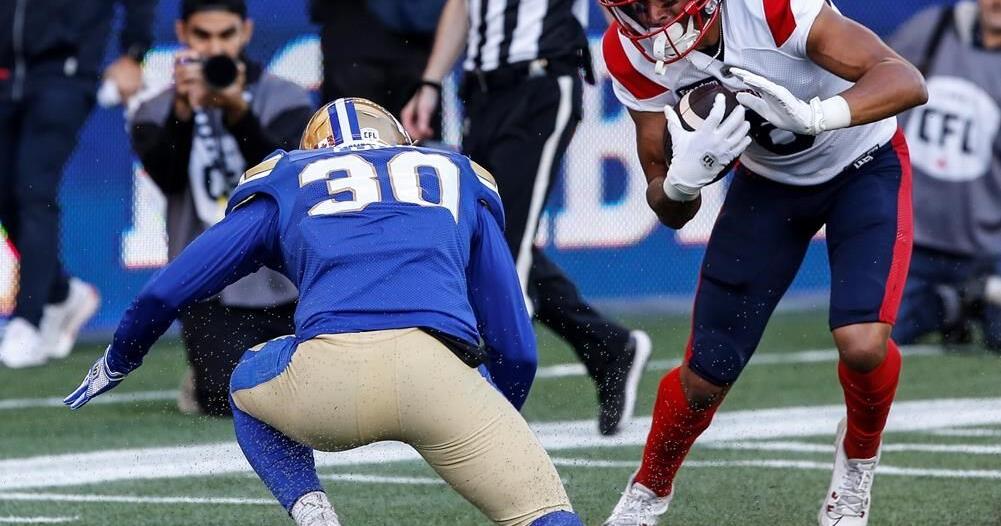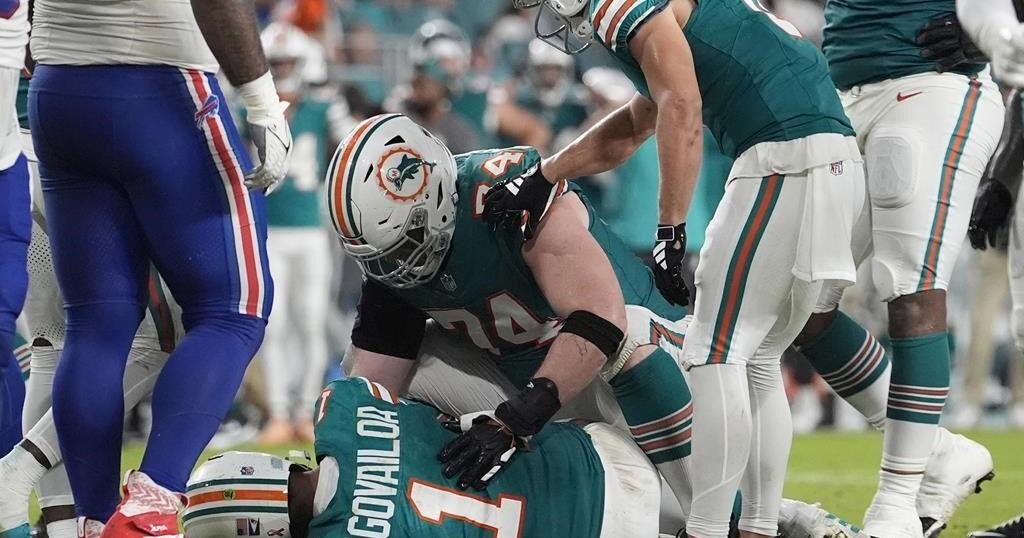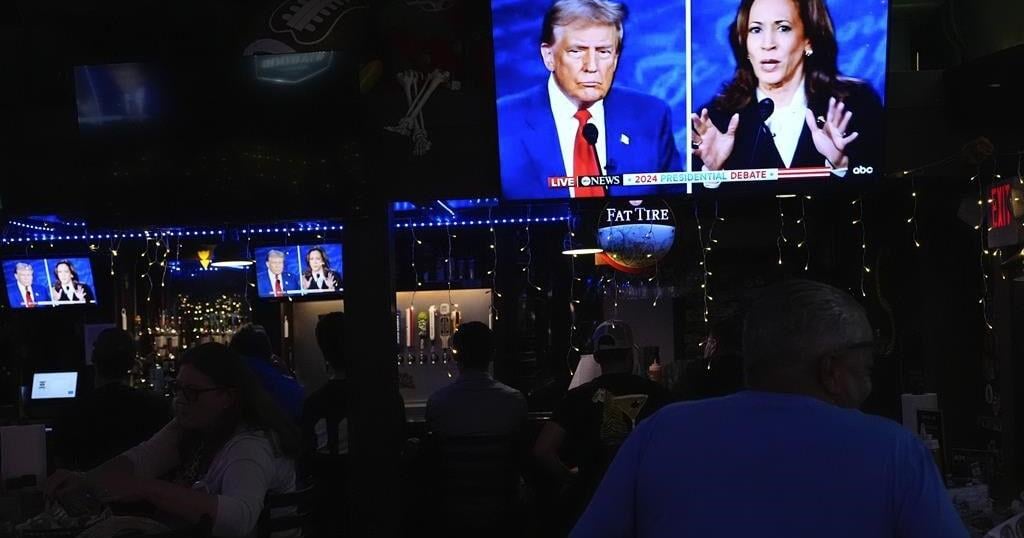MIAMI GARDENS, Fla. (AP) — Miami Dolphins quarterback Tua Tagovailoa sustained a concussion for the third time in his NFL career, leaving his team’s game Thursday night against Buffalo after running into defensive back Damar Hamlin and hitting the back of his head against the turf.
Tagovailoa remained down for about two minutes before getting to his feet and walking to the sideline after the play in the third quarter. He made his way to the tunnel not long afterward, looking into the stands before smiling and departing toward the locker room.
The Dolphins needed almost no time before announcing it was a concussion. The team said he had two during the 2022 season, and Tagovailoa was diagnosed with another concussion when he was a college player at Alabama.
Dolphins coach Mike McDaniel said Tagovailoa would get “proper procedural evaluation” and “appropriate care” on Friday.
“The furthest thing from my mind is, ‘What is the timeline?’ We just need to evaluate and just worry about my teammate, like the rest of the guys are,” McDaniel said. “We’ll get more information tomorrow and take it day by day from here.”
Some players saw Tagovailoa in the locker room after the game and said they were encouraged. Tagovailoa spoke with some players and then went home after the game, McDaniel said.
“I have a lot of love for Tua, built a great relationship with him,” said quarterback Skylar Thompson, who replaced Tagovailoa after the injury. “You care about the person more than the player and everybody in the organization would say the same thing. Just really praying for Tua and hopefully everything will come out all right.”
Tagovailoa signed a four-year, $212 million extension before this season — a deal that makes him one of the highest-paid players in the NFL — and was the NFL’s leading passer in Week 1 this season. Tagovailoa left with the Dolphins trailing 31-10, and that was the final score.
“If you know Tua outside of football, you can’t help but feel for him,” Bills quarterback Josh Allen said on Amazon following the game. “He’s a great football player but he’s an even greater human being. He’s one of the best humans on the planet. I’ve got a lot of love for him and I’m just praying for him and his family, hoping everything’s OK. But it’s tough, man. This game of football that we play, it’s got its highs and it’s got its lows — and this is one of the lows.”
Tagovailoa’s college years and first three NFL seasons were marred by injury, though he positioned himself for a big pay bump with an injury-free and productive 2023 as he led the Dolphins into the playoffs. He threw for 29 touchdowns and a league-best 4,624 yards last year.
When, or if, he can come back this season is anyone’s guess. Tagovailoa said in April 2023 that the concussions he had in the 2022 season left him contemplating his playing future. “I think I considered it for a time,” he said then, when asked if he considered stepping away from the game to protect himself.
McDaniel said it’s not his place to say if Tagovailoa should return to football. “He’ll be evaluated and we’ll have conversations and progress as appropriate,” McDaniel said.
Tagovailoa was hurt Thursday on a fourth-down keeper with about 4:30 left in the third. He went straight ahead into Hamlin and did not slide, leading with his right shoulder instead.
Hamlin was the player who suffered a cardiac arrest after making a tackle during a Monday night game in January 2023 at Cincinnati, causing the NFL to suspend a pivotal game that quickly lost significance in the aftermath of a scary scene that unfolded in front of a national television audience.
Tagovailoa wound up on his back, both his hands in the air and Bills players immediately pointed at him as if to suggest there was an injury. Dolphins center Aaron Brewer quickly did the same, waving to the sideline.
Tagovailoa appeared to be making a fist with his right hand as he lay on the ground. It was movement consistent with something that is referred to as the “fencing response,” which can be common after a traumatic brain injury.
Tagovailoa eventually got to his feet. McDaniel grabbed the side of his quarterback’s head and gave him a kiss on the cheek as Tagovailoa departed. Thompson came into the game to take Tagovailoa’s spot.
“I love Tua on and off the football field,” Bills edge Von Miller said. “I’m a huge fan of him. I can empathize and sympathize with him because I’ve been there. I wish him the best.”
Tagovailoa’s history with concussions — and how he has since worked to avoid them — is a huge part of the story of his career, and now comes to the forefront once again.
He had at least two concussions during the 2022 season. He was hurt in a Week 3 game against Buffalo and cleared concussion protocol, though he appeared disoriented on that play but returned to the game.
The NFL later changed its concussion protocol to mandate that if a player shows possible concussion symptoms — including a lack of balance or stability — he must sit out the rest of the game.
Less than a week later, in a Thursday night game at Cincinnati, Tagovailoa was concussed on a scary hit that briefly knocked him unconscious and led to him being taken off the field on a stretcher.
His second known concussion of that season came in a December game against Green Bay, and he didn’t play for the rest of the 2022 season. After that, Tagovailoa began studying ways where he may be able to fall more safely and protect himself against further injury — including studying jiu-jitsu.
“I’m not worried about anything that’s out of my hands,” McDaniel said. “I’m just worried about the human being.”
___
AP NFL:

